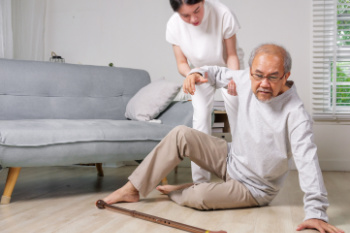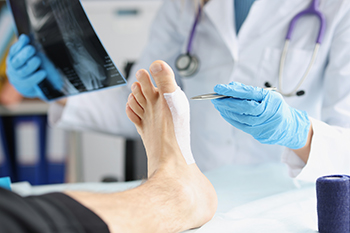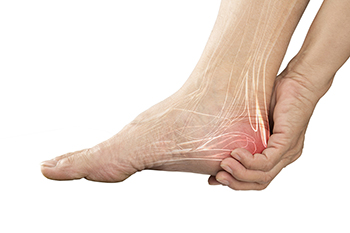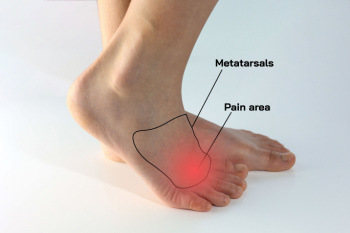Items filtered by date: August 2024
Causes of Falling and Prevention Methods

Falls can be caused by various factors such as slippery surfaces, poor lighting, and obstacles like loose rugs. Medical conditions, such as dizziness or visual impairments, as well as certain medications, can also increase fall risk. Effective fall prevention involves the 4Ps, which are pain, position, placement, and personal needs. Pain management is essential, as discomfort can affect balance and mobility. Positioning oneself carefully, especially when standing up or moving, helps maintain stability. Proper placement of furniture and other items ensures that pathways are clear and safe. Finally, addressing personal needs such as regular exercise to strengthen muscles and managing health conditions can further reduce the risk of falls. Falling can seriously impact the feet. If you have fallen and have foot pain, it is suggested that you visit a podiatrist who can offer you effective relief and treatment solutions.
Preventing falls among the elderly is very important. If you are older and have fallen or fear that you are prone to falling, consult with one of our podiatrists from Ankle & Foot Care Center. Our doctors will assess your condition and provide you with quality advice and care.
Every 11 seconds, an elderly American is being treated in an emergency room for a fall related injury. Falls are the leading cause of head and hip injuries for those 65 and older. Due to decreases in strength, balance, senses, and lack of awareness, elderly persons are very susceptible to falling. Thankfully, there are a number of things older persons can do to prevent falls.
How to Prevent Falls
Some effective methods that older persons can do to prevent falls include:
- Enrolling in strength and balance exercise program to increase balance and strength
- Periodically having your sight and hearing checked
- Discuss any medications you have with a doctor to see if it increases the risk of falling
- Clearing the house of falling hazards and installing devices like grab bars and railings
- Utilizing a walker or cane
- Wearing shoes that provide good support and cushioning
- Talking to family members about falling and increasing awareness
Falling can be a traumatic and embarrassing experience for elderly persons; this can make them less willing to leave the house, and less willing to talk to someone about their fears of falling. Doing such things, however, will increase the likelihood of tripping or losing one’s balance. Knowing the causes of falling and how to prevent them is the best way to mitigate the risk of serious injury.
If you have any questions, please feel free to contact our office located in Jupiter, FL . We offer the newest diagnostic and treatment technologies for all your foot care needs.
Recovering from Foot Surgery

Recovering from foot surgery requires careful preparation to ensure a smooth healing process. Start by stocking up on essential groceries and easy-to-prepare meals to avoid frequent trips to the store. Having everything you need within reach will make daily life more manageable while you are less mobile. Additionally, it is important to move furniture and obstacles out of your path to create a clear, and safe environment. This prevents potential trips and falls that could hinder your recovery. Keep frequently used items within easy reach and set up a comfortable resting area where you can elevate your foot to reduce swelling. By planning ahead and creating a supportive environment, you can focus on healing and minimize the risk of complications during your recovery. If you have had any type of foot surgery, it is suggested that you schedule regular appointments with your podiatrist who can guide you on specific recovery methods for your type of surgery.
Foot surgery is sometimes necessary to treat a foot ailment. To learn more, contact one of our podiatrists of Ankle & Foot Care Center. Our doctors will assist you with all of your foot and ankle needs.
When Is Surgery Necessary?
Foot and ankle surgery is generally reserved for cases in which less invasive, conservative procedures have failed to alleviate the problem. Some of the cases in which surgery may be necessary include:
- Removing foot deformities like bunions and bone spurs
- Severe arthritis that has caused bone issues
- Cosmetic reconstruction
What Types of Surgery Are There?
The type of surgery you receive will depend on the nature of the problem you have. Some of the possible surgeries include:
- Bunionectomy for painful bunions
- Surgical fusion for realignment of bones
- Neuropathy decompression surgery to treat nerve damage
Benefits of Surgery
Although surgery is usually a last resort, it can provide more complete pain relief compared to non-surgical methods and may allow you to finally resume full activity.
Surgical techniques have also become increasingly sophisticated. Techniques like endoscopic surgery allow for smaller incisions and faster recovery times.
If you have any questions please feel free to contact our office located in Jupiter, FL . We offer the newest diagnostic and treatment technologies for all your foot and ankle needs.
Heel Pad Syndrome
 Heel pad syndrome is a painful condition affecting the heel's fatty tissue, leading to discomfort and difficulty walking. This syndrome occurs when the heel's fat pad, which acts as a shock absorber, deteriorates or thins out, often due to excessive stress or injury. The condition can result from aging, repetitive high-impact activities like running or jumping, prolonged standing, or being overweight. Heel pad syndrome can affect anyone but is more common among athletes, older adults, and individuals with occupations requiring extended periods of time on their feet. Symptoms typically include a deep, bruised feeling in the heel, particularly noticeable during weight-bearing activities. This pain can be sharp or aching, worsening with activity and improving with rest. If you have painful heels, it is suggested that you schedule an appointment with a podiatrist who may prescribe orthotics, heel cups, specific exercises, and anti-inflammatory medication.
Heel pad syndrome is a painful condition affecting the heel's fatty tissue, leading to discomfort and difficulty walking. This syndrome occurs when the heel's fat pad, which acts as a shock absorber, deteriorates or thins out, often due to excessive stress or injury. The condition can result from aging, repetitive high-impact activities like running or jumping, prolonged standing, or being overweight. Heel pad syndrome can affect anyone but is more common among athletes, older adults, and individuals with occupations requiring extended periods of time on their feet. Symptoms typically include a deep, bruised feeling in the heel, particularly noticeable during weight-bearing activities. This pain can be sharp or aching, worsening with activity and improving with rest. If you have painful heels, it is suggested that you schedule an appointment with a podiatrist who may prescribe orthotics, heel cups, specific exercises, and anti-inflammatory medication.
Many people suffer from bouts of heel pain. For more information, contact one of our podiatrists of Ankle & Foot Care Center. Our doctors can provide the care you need to keep you pain-free and on your feet.
Causes of Heel Pain
Heel pain is often associated with plantar fasciitis. The plantar fascia is a band of tissues that extends along the bottom of the foot. A rip or tear in this ligament can cause inflammation of the tissue.
Achilles tendonitis is another cause of heel pain. Inflammation of the Achilles tendon will cause pain from fractures and muscle tearing. Lack of flexibility is also another symptom.
Heel spurs are another cause of pain. When the tissues of the plantar fascia undergo a great deal of stress, it can lead to ligament separation from the heel bone, causing heel spurs.
Why Might Heel Pain Occur?
- Wearing ill-fitting shoes
- Wearing non-supportive shoes
- Weight change
- Excessive running
Treatments
Heel pain should be treated as soon as possible for immediate results. Keeping your feet in a stress-free environment will help. If you suffer from Achilles tendonitis or plantar fasciitis, applying ice will reduce the swelling. Stretching before an exercise like running will help the muscles. Using all these tips will help make heel pain a condition of the past.
If you have any questions please contact our office located in Jupiter, FL . We offer the newest diagnostic and treatment technologies for all your foot and ankle needs.
Definition and Relief Methods of Morton’s Neuroma

Morton's neuroma is a compressive neuropathy of the forefoot interdigital nerve, that results in a thickening of tissue surrounding the nerves leading to the toes. It typically affects the nerves between the third and fourth toes. This condition causes pain, numbness, or a burning sensation in the ball of the foot, often worsened by wearing narrow shoes or high heels that squeeze the toes together. Relief methods focus on alleviating pressure on the affected nerve, such as wearing shoes with a wide toe box to reduce compression. Padded inserts or orthotics can help to distribute weight evenly and support the arch, relieving strain on the forefoot. Massaging the area can reduce inflammation and provide temporary relief. In severe cases, corticosteroid injections or surgical removal of the neuroma may be considered to alleviate persistent symptoms and restore comfort and function to the foot. If you have pain in this part of your foot, it is suggested that you promptly schedule an appointment with a podiatrist who can successfully diagnose and treat Morton’s neuroma.
Morton’s neuroma is a very uncomfortable condition to live with. If you think you have Morton’s neuroma, contact one of our podiatrists of Ankle & Foot Care Center. Our doctors will attend to all of your foot care needs and answer any of your related questions.
Morton’s Neuroma
Morton's neuroma is a painful foot condition that commonly affects the areas between the second and third or third and fourth toe, although other areas of the foot are also susceptible. Morton’s neuroma is caused by an inflamed nerve in the foot that is being squeezed and aggravated by surrounding bones.
What Increases the Chances of Having Morton’s Neuroma?
- Ill-fitting high heels or shoes that add pressure to the toe or foot
- Jogging, running or any sport that involves constant impact to the foot
- Flat feet, bunions, and any other foot deformities
Morton’s neuroma is a very treatable condition. Orthotics and shoe inserts can often be used to alleviate the pain on the forefront of the feet. In more severe cases, corticosteroids can also be prescribed. In order to figure out the best treatment for your neuroma, it’s recommended to seek the care of a podiatrist who can diagnose your condition and provide different treatment options.
If you have any questions, please feel free to contact our office located in Jupiter, FL . We offer the newest diagnostic and treatment technologies for all your foot care needs.

